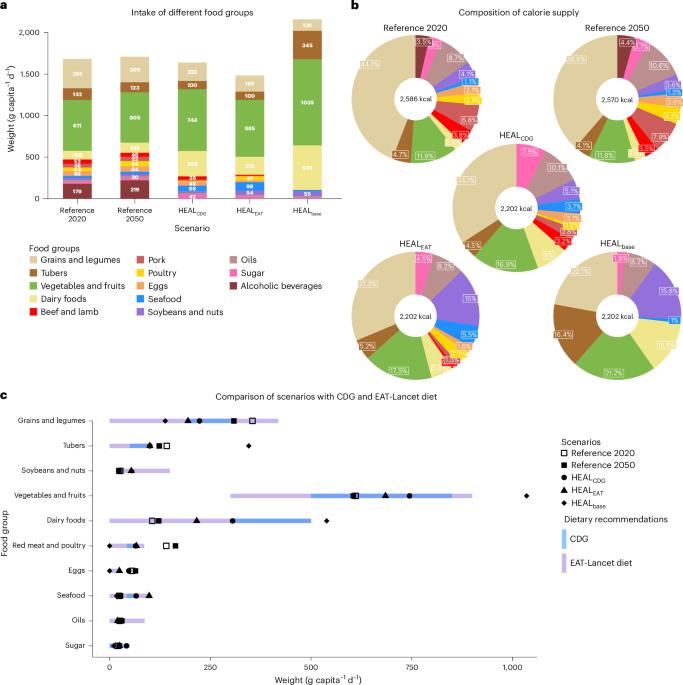The multiple benefits of Chinese dietary transformation
IF 27.1
1区 环境科学与生态学
Q1 ENVIRONMENTAL SCIENCES
引用次数: 0
Abstract
The transition to more sustainable diets is critical to achieve the Sustainable Development Goals and meet the Paris Agreement commitments. In China, this transition is particularly urgent due to the double burden of malnutrition and environmental degradation. In this study, we explored the potential of alternative diets in China to enhance public health, ensure food affordability and reduce adverse environmental impacts. We assessed these patterns through a multi-objective diet optimization model combined with an agro-economic modelling framework that captures key socio-economic and biophysical dynamics in China. The proposed healthy, affordable and low-environmental-impact diets substantially improve dietary quality and are projected to reduce food expenditures by 20–28% (US$128–186 capita−1 in power purchasing parities of 2005) by 2050. These diets also bring environmental benefits, including a 3–11% (4–13 Mha) expansion of non-forest natural vegetation area and modest biodiversity gains by 2050, a 9–40% (3–13 Gt CO2-equivalent) reduction in greenhouse gas emissions and a 5–12% (347–772 km3) decrease in freshwater withdrawals between 2020 and 2050. Our findings underscore the potential to achieve multiple co-benefits through long-term and target-oriented dietary transformations, while also balancing the transformation feasibility with achievable gains. The transition to sustainable diets is challenging for countries that face malnutrition and limited resources. Now a study explores how various dietary transformations in China can improve public health, make food affordable and reduce environmental impacts, while evaluating the feasibility of the diet changes.

中国饮食转变的多重好处
向更可持续饮食过渡对于实现可持续发展目标和履行《巴黎协定》承诺至关重要。在中国,由于营养不良和环境恶化的双重负担,这种转变尤为紧迫。在这项研究中,我们探索了替代饮食在中国的潜力,以提高公众健康,确保食品的可负担性和减少不利的环境影响。我们通过多目标饮食优化模型结合农业经济建模框架来评估这些模式,该模型捕捉了中国关键的社会经济和生物物理动态。拟议的健康、负担得起和低环境影响的饮食大大改善了饮食质量,预计到2050年将使粮食支出减少20-28%(按2005年电力购买力平价计算,人均128-186美元)。这些饮食还带来了环境效益,包括到2050年非森林自然植被面积扩大3-11%(4-13公顷),生物多样性略有增加,温室气体排放量减少9-40%(3-13亿吨二氧化碳当量),2020年至2050年期间淡水取水量减少5-12%(347-772立方公里)。我们的研究结果强调了通过长期和目标导向的饮食转变实现多种协同效益的潜力,同时也平衡了转变的可行性和可实现的收益。对于面临营养不良和资源有限的国家来说,向可持续饮食过渡是一项挑战。现在,一项研究探讨了中国的各种饮食转变如何改善公共健康,使食品负担得起并减少对环境的影响,同时评估了饮食变化的可行性。
本文章由计算机程序翻译,如有差异,请以英文原文为准。
求助全文
约1分钟内获得全文
求助全文
来源期刊

Nature Sustainability
Energy-Renewable Energy, Sustainability and the Environment
CiteScore
41.90
自引率
1.10%
发文量
159
期刊介绍:
Nature Sustainability aims to facilitate cross-disciplinary dialogues and bring together research fields that contribute to understanding how we organize our lives in a finite world and the impacts of our actions.
Nature Sustainability will not only publish fundamental research but also significant investigations into policies and solutions for ensuring human well-being now and in the future.Its ultimate goal is to address the greatest challenges of our time.
 求助内容:
求助内容: 应助结果提醒方式:
应助结果提醒方式:


